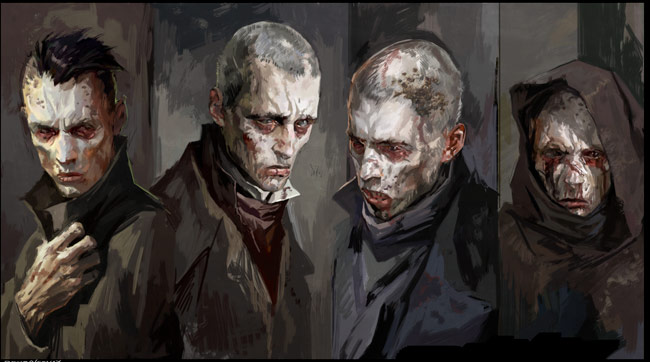1) I stumbled upon this blog on being a games artist and in the "What software I should learn" section, it says " For starters, you should learn Photoshop. It's pretty much the industry standard for 2D artwork. " Why is it this case? I thought Adobe Illustrator and similar vector based drawing programs like Inkscape is standard for 2d artwork. Where does photoshop come in?
Photoshop is an image editor and freehand painting platform. Illustrator is a Vector illustration suite.
Illustrator would be standard for assets for iOS games and other simple 2D assets, I should think, what with the vectors, perhaps also inorganic design work, but Photoshop's workflow is much more suited to things such as concept art and other organic designs.
A lot of people even do UI work in Photoshop, if I've heard correctly.
In any case, people expect this from Photoshop:

(Copyright Arkane and Viktor Antonov)
And this from Illustrator: 
(Source Needed; Illustrator feature picture I believe)
Not quite the same, is it?
While I was searching, I saw a few beautiful painted works that cited Adobe Illustrator, but I can't be sure of any of them, and they were sandwiched between standard vector works. So I'd say it's probably the exception that you can make works like that, and not the rule.
2) Do employers mind if I use freeware programs? I learned how to use photoshop in high school for image manipulation and moved on to a freeware program called GIMP and still has it to this day. Right now, I am practicing vector drawing on Inkscape (Freeware program compared to Illustrator). I have experience in photoshop and illustrator but I am using freeware counterparts because Photoshop and Illustrator combined are expensive, especially since I have loans to pay for college.
I find GIMP to be horrid! It's not really the same at all. However, that's a personal opinion, and I'm pretty sure if your artistic skills and design sense are honed enough they won't give a diddly squat whether you design using MSPaint and Flash. It's just that you'll probably (and note the probably) be using Photoshop if you're hired to do stuff that they use Photoshop for, so it's a massive plus to them if they know that they won't have to get someone to teach you.
3) Ok so this may not have to do with the topic but since I am here: Do game artists stay at one company for long or are they like freelancers? I checked out some game art portfolios and the resumes attached. To my surprise, they have worked at multiple game companies as if they were job hopping. I was hoping to stay at one company for a while...
Both. Some are hired and work by salary, some are freelancers and are outsourced. However, I think what you're seeing is more of a weird thing that games companies sometimes do where they hire a team to work on a game...
Then proceed to lay everyone off when it's out or just after a period of time as passed.
I'm sure this isn't too common, but I've heard a lot of stories; and it seems like the general attitude is that you're not expected to stay at one company for all of your career like it might be in some other industries.
Some of this might be a bit off, since I'm still a student, but I hope this does clear up some things.














